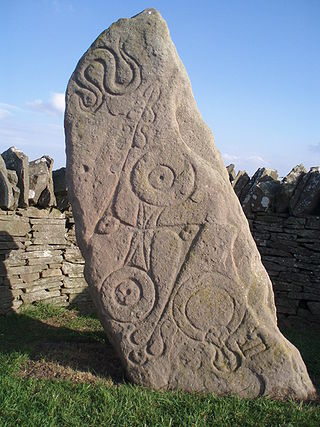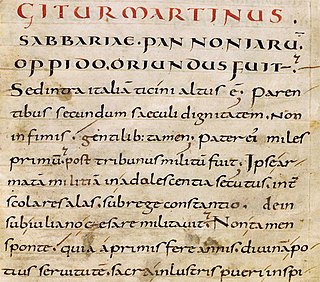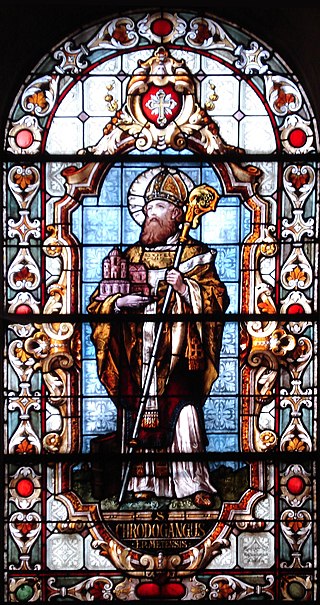Related Research Articles

Excalibur is the mythical sword of King Arthur that may possess magical powers or be associated with the rightful sovereignty of Britain. Traditionally, the sword in the stone is the proof of Arthur's lineage. The sword given to him by the Lady of the Lake is not the same weapon, even though in some versions of the legend both of them share the name of Excalibur. Several similar swords and other weapons also appear within Arthurian texts, as well as in other legends.

The Picts were a group of peoples in what is now Scotland north of the Firth of Forth, in the Early Middle Ages. Where they lived and details of their culture can be gleaned from early medieval texts and Pictish stones. The name Picti appears in written records as an exonym from the late third century AD. They are assumed to have been descendants of the Caledonii and other northern Iron Age tribes. Their territory is referred to as "Pictland" by modern historians. Initially made up of several chiefdoms, it came to be dominated by the Pictish kingdom of Fortriu from the seventh century. During this Verturian hegemony, Picti was adopted as an endonym. This lasted around 160 years until the Pictish kingdom merged with that of Dál Riata to form the Kingdom of Alba, ruled by the House of Alpin. The concept of "Pictish kingship" continued for a few decades until it was abandoned during the reign of Caustantín mac Áeda.

Scholasticism was a medieval school of philosophy that employed a critical organic method of philosophical analysis predicated upon Aristotelianism and the Ten Categories. Christian scholasticism emerged within the monastic schools that translated scholastic Judeo-Islamic philosophies, and "rediscovered" the collected works of Aristotle. Endeavoring to harmonize his metaphysics and its account of a prime mover with the Latin Catholic dogmatic trinitarian theology, these monastic schools became the basis of the earliest European medieval universities, and thus became the bedrock for the development of modern science and philosophy in the Western world. Scholasticism dominated education in Europe from about 1100 to 1700. The rise of scholasticism was closely associated with these schools that flourished in Italy, France, Portugal, Spain and England.

In Celtic cultures, a bard is an oral repository and professional story teller, verse-maker, music composer, oral historian and genealogist, employed by a patron to commemorate one or more of the patron's ancestors and to praise the patron's own activities.

A hagiography is a biography of a saint or an ecclesiastical leader, as well as, by extension, an adulatory and idealized biography of a preacher, priest, founder, saint, monk, nun or icon in any of the world's religions. Early Christian hagiographies might consist of a biography or vita, a description of the saint's deeds or miracles, an account of the saint's martyrdom, or be a combination of these.

Ogham is an Early Medieval alphabet used primarily to write the early Irish language, and later the Old Irish language. There are roughly 400 surviving orthodox inscriptions on stone monuments throughout Ireland and western Britain, the bulk of which are in southern Munster. The largest number outside Ireland are in Pembrokeshire, Wales.
The word seneschal can have several different meanings, all of which reflect certain types of supervising or administering in a historic context. Most commonly, a seneschal was a senior position filled by a court appointment within a royal, ducal, or noble household during the Middle Ages and early Modern period – historically a steward or majordomo of a medieval great house. In a medieval royal household, a seneschal was in charge of domestic arrangements and the administration of servants, which, in the medieval period particularly, meant the seneschal might oversee hundreds of laborers, servants and their associated responsibilities, and have a great deal of power in the community, at a time when much of the local economy was often based on the wealth and responsibilities of such a household.

Medieval Latin was the form of Literary Latin used in Roman Catholic Western Europe during the Middle Ages. In this region it served as the primary written language, though local languages were also written to varying degrees. Latin functioned as the main medium of scholarly exchange, as the liturgical language of the Church, and as the working language of science, literature, law, and administration.

Insular script is a medieval script system originating in Ireland that spread to England and continental Europe under the influence of Irish Christianity. Irish missionaries took the script to continental Europe, where they founded monasteries, such as Bobbio. The scripts were also used in monasteries, like Fulda, which were influenced by English missionaries. They are associated with Insular art, of which most surviving examples are illuminated manuscripts. It greatly influenced modern Gaelic type and handwriting.

The Annals of Inisfallen are a chronicle of the medieval history of Ireland.

Primitive Irish or Archaic Irish, also called Proto-Goidelic, is the oldest known form of the Goidelic languages, and the ancestor of all languages within this family.

The Chronicon Pictum or Illuminated Chronicle is a medieval illustrated chronicle from the Kingdom of Hungary from the 14th century. It represents the artistic style of the royal court of King Louis I of Hungary. The codex is a unique source of art, medieval and cultural history.

Chrodegang was the Frankish Bishop of Metz from 742 or 748 until his death. He served as chancellor for his kinsman, Charles Martel. Chrodegang is claimed to be a progenitor of the Frankish dynasty of the Robertians. He is recognized as a saint in the Catholic Church.

Britonia is the name of a Romano-British settlement on the northern coast of the Iberian peninsula at the time of the Anglo-Saxon invasion of Britain. The area is roughly that of the northern parts of the modern provinces of A Coruña and Lugo in the autonomous community of Galicia, Spain.

Secundinus, or Sechnall as he was known in Irish, was founder and patron saint of Domhnach Sechnaill, County Meath, who went down in medieval tradition as a disciple of St Patrick and one of the first bishops of Armagh. Historians have suggested, however, that the connection with St Patrick was a later tradition invented by Armagh historians in favour of their patron saint and that Secundinus is more likely to have been a separate missionary, possibly a companion of Palladius.
Anglo-Latin literature is literature from originally written in Latin and produced in England or other English-speaking parts of Britain and Ireland. It was written in Medieval Latin, which differs from the earlier Classical Latin and Late Latin.
Gearóid Mac Niocaill (1932–2004) was one of the foremost twentieth-century scholars and interpreters of late medieval Irish tracts.
Richard Sharpe,, Hon. was a British historian and academic, who was Professor of Diplomatic at the University of Oxford and a fellow of Wadham College, Oxford. His broad interests were the history of medieval England, Ireland, Scotland and Wales. He had a special concern with first-hand work on the primary sources of medieval history, including the practices of palaeography, diplomatic and the editorial process, as well as the historical and legal contexts of medieval documents. He was the general editor of the Corpus of British Medieval Library Catalogues, and editor of a forthcoming edition of the charters of King Henry I of England.
Michael Lapidge, FBA is a scholar in the field of Medieval Latin literature, particularly that composed in Anglo-Saxon England during the period 600–1100 AD; he is an emeritus Fellow of Clare College, Cambridge, a Fellow of the British Academy, and winner of the 2009 Sir Israel Gollancz Prize.
References
- ↑ A New History of Ireland, Vol. 1, p. 979.